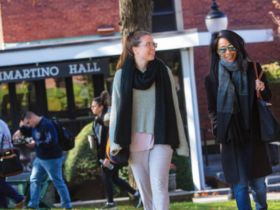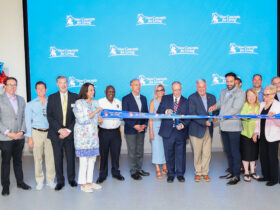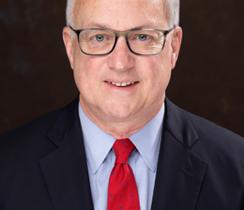Funding to Support Dr. Chitra Dahia’s Research on Root Cause of Chronic Back Pain
A scientist at Hospital for Special Surgery (HSS), Chitra Dahia, PhD, has received two National Institutes of Health (NIH) grants totaling $6 million for translational research aimed at understanding the root cause of disc degeneration and chronic back pain in order to develop treatment options that do not rely on addictive pain-relieving medications.
This funding will support Dr. Dahia’s Spine Development and Regeneration Lab to study the potential of two important developmental molecules in the reversal of age-related intervertebral disc (IVD) pathologies and in the treatment of chronic back pain.
“Approximately 70 percent of the U.S. population is affected by chronic back pain, negatively impacting longevity and quality of life,” said Dr. Dahia. “There is currently no treatment available for disc degeneration, which is a big concern when you look at the world’s aging population. With the lack of treatment options, people can become dependent on strong pain relievers such as opioids.”
“It is an incredible honor for Dr. Dahia to receive these two NIH grants,” said Lionel B. Ivashkiv, MD, chief scientific officer at HSS. “Being awarded an NIH grant is the highest metric of scientific quality and impact. The application itself is peer-reviewed and quite rigorous.”
Dr. Dahia received the first 5-year grant for $2.8 million from the National Institute of Arthritis and Musculoskeletal and Skin Diseases (NIAMS)/NIH R01 to study the role of the sonic hedgehog (SHH)/Brachyury axis in the maintenance of the postnatal IVD. This work aims to identify the role of Brachyury, a critical developmental molecule first reported in the nucleus pulposus cells of postnatal disc by Dr. Dahia herself in 2009, in the growth and maintenance of the postnatal IVD, how its age-related loss causes disc pathologies and peripheral sensitization and pain, and whether this can be prevented. The study findings will also identify targets to reverse painful disc pathology and help regenerate the disc.
She was then awarded the National Institute of Aging (NIA)/NIH R01 5-year grant for $3.3 million to study the role of developmental signaling pathways in the maintenance of spinal discs. The study is focused on understanding the crosstalk between major developmental signaling pathways interacting with SHH signaling (also first shown by Dr. Dahia in 2009) in temporal regulation of the different components of the IVD and their beneficial effect in maintenance and activation of disc progenitor cells. The research intends to discover if there is a potential for disc regeneration using its own cells, and is being done in collaboration with Todd J. Albert, MD, spine surgeon and surgeon-in-chief emeritus of HSS. Dr. Albert and his team will test Dr. Dahia’s findings in clinical conditions.
“Initially, we found that these crucial developmental molecules are expressed in very young spinal discs, and recently we observed that they decline with age and disc pathology, hence we are now evaluating their function from stages of growth and maturation to aging,” explained Dr. Dahia.
Dr. Dahia has committed her career to developing a full understanding of disc biology as they grow, mature, and age to identify potential avenues for therapeutics. She previously received an NIH grant in 2014 to study how the Wnt/SHH signaling loop controls IVD growth and differentiation. When Dr. Dahia began her research in disc biology over a decade ago, she was one of the first to study the beneficial role of developing molecules in the postnatal spine. Now, this is being adapted in other musculoskeletal research in a broader sense.
According to Dr. Dahia, other researchers have tried to use stem cells to solve these issues, but the cells are unable to survive due to the harsh microenvironment of the disc. “Our lab’s process is unique, as we aim understand the cellular and molecular basis of disc pathology and know how to intersect it, using our unique and novel genetic strategies,” she noted.
Dr. Dahia’s Spine Development and Regeneration Lab at HSS concentrates on understanding the role of key developmental cell signaling pathways and molecules in the development and homeostasis of various musculoskeletal tissues including the IVD, spinal column, growth plate, and tendon. The lab’s primary focus is on IVD development and maintenance and whether developmental pathways and molecules can prevent age-related disc pathologies and associated neurological symptoms or regenerate the degenerated discs.
“These scientific discoveries can directly impact future directions of musculoskeletal research to best improve clinical outcomes,” said Dr. Dahia who noted that HSS research is aimed at enriching the lives of patients suffering from debilitating orthopedic and rheumatic conditions.
HSS is the world’s leading academic medical center focused on musculoskeletal health. At its core is Hospital for Special Surgery, nationally ranked No. 1 in orthopedics (for the 12th consecutive year), No. 4 in rheumatology by U.S. News & World Report (2021-2022), and the best pediatric orthopedic hospital in NY, NJ and CT by U.S. News & World Report “Best Children’s Hospitals” list (2021-2022). HSS is ranked world #1 in orthopedics by Newsweek (2021-2022). Founded in 1863, the Hospital has the lowest complication and readmission rates in the nation for orthopedics, and among the lowest infection rates. HSS was the first in New York State to receive Magnet Recognition for Excellence in Nursing Service from the American Nurses Credentialing Center five consecutive times. The global standard total knee replacement was developed at HSS in 1969. An affiliate of Weill Cornell Medical College, HSS has a main campus in New York City and facilities in New Jersey, Connecticut and in the Long Island and Westchester County regions of New York State, as well as in Florida. In addition to patient care, HSS leads the field in research, innovation and education. The HSS Research Institute comprises 20 laboratories and 300 staff members focused on leading the advancement of musculoskeletal health through prevention of degeneration, tissue repair and tissue regeneration. The HSS Global Innovation Institute was formed in 2016 to realize the potential of new drugs, therapeutics and devices. The HSS Education Institute is a trusted leader in advancing musculoskeletal knowledge and research for physicians, nurses, allied health professionals, academic trainees, and consumers in more than 130 countries. The institution is collaborating with medical centers and other organizations to advance the quality and value of musculoskeletal care and to make world-class HSS care more widely accessible nationally and internationally. www.hss.edu.













